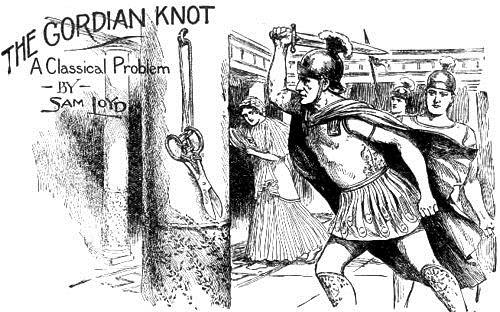



OF COURSE AT THIS late day it would be impossible to correct the great injustice done to poor Gordius, nevertheless, as true blue puzzlists we can condemn the high-handed manner in which Alexander the Great, competing in a puzzle contest, proceeded to make himself the umpire, and awarded the prize for his solution, which was as absurd as it was unfair. He established a dangerous precedent and encouraged a kind of puzzle brigandage which is not extinct to this day, as we often find young Alexanders, who would like to solve puzzles according to their own notions and capture prizes after the manner of pirates.
Gordius was an unsophisticated countryman, who raised sheep and grapes, but who by his extreme cleverness became King of Phrygia, and is known in history as the plough boy king. It is told that when he assumed the sceptre he tied his former implements with what is known in history as the Gordian knot, but in such a peculiar way that the knots could not be unfastened and the oracles proclaimed that whoever could untie them would become the Emperor.
Alexander the Great, it is told, made many ineffectual attempts to untie some of the knots, but finally becoming enraged at his want of success, drew his sword and cut the cord, exclaiming that ÔÇťsuch is the common sense way to get a thing when you want it.ÔÇŁ Strange that those familiar with the story and its contemptible climax indorse it with a certain air of assumed pride when they have surmounted some difficulty and exclaim: ÔÇťI have cut the Gordian-knot!ÔÇŁ
According to historians and all writers on the subject the puzzle was a fair and legitimate one, and so accurately and minutely described that many attempts have been made to picture it. And some curious and complicated knots have been invented by imitators of Gordius. I wonder whether they would be satisfied with the answers to their puzzles if the solvers followed the methods of Alexander. The only protest against the solution to the Gordian knot, which I can recall, were some clever lines which must be of very ancient origin:
ÔÇťA puzzle is not solved, impatient sirs,
By peeping at its answer in a triceÔÇ”
When Gordius, the plow-boy king of Phrygia,
Tied up his implements of husbandry In the far-famed knot, rash Alexander
Did not undo, by cutting it in twain.ÔÇŁ
In presenting the puzzle, I have drawn largely upon encyclopedia lore, but have conformed strictly to the description as I find it. They all agree that the cord was so fixed that, no ends could be found and that the implements of husbandry were tied to a staple in the temple of the gods. I have taken LattimerÔÇÖs intimation that the implements may have been tied separately, and I accept his reference to the pruning shears as being worthy of special illustration, and the more especially as it is safe to say that all of our puzzlists can obtain assistance from their fair friends in the matter of accommodation with a pair of scissors.
The puzzle is designed especially for the summer outings, and should become popular at the seashore as well as at the mountain-resorts. It can readily be solved by patience, perseverance and quiet study, It is a puzzle to be solved in some quiet nook, ÔÇťfar from the maddening crowd.ÔÇŁ Get a piece of cord about one yard long, tie the ends together so as to make an endless piece. Take any kind of ordinary scissors and arrange the string exactly as shown in the picture, only instead of fastening the cord through the staple, throw it, like a necklace, over the head of a young lady, seated in a convenient position, who will aid you to win the crown of Asia by removing the scissors.
Our puzzlist readily discovered by actual practice that the scissors may be removed from the string by working the loop backwards along the double cord. First down on the left side, up through the center, down on the right side, up the center, down the left, up center, down left and then pass the scissors through the loop, and they will come off if you have not produced an unfortunate tangle by twisting the cord.
2.
A man bought two fishes, but on taking them home found he had three; how was this? He had twoÔÇ”and one smelt.
[Page 184]